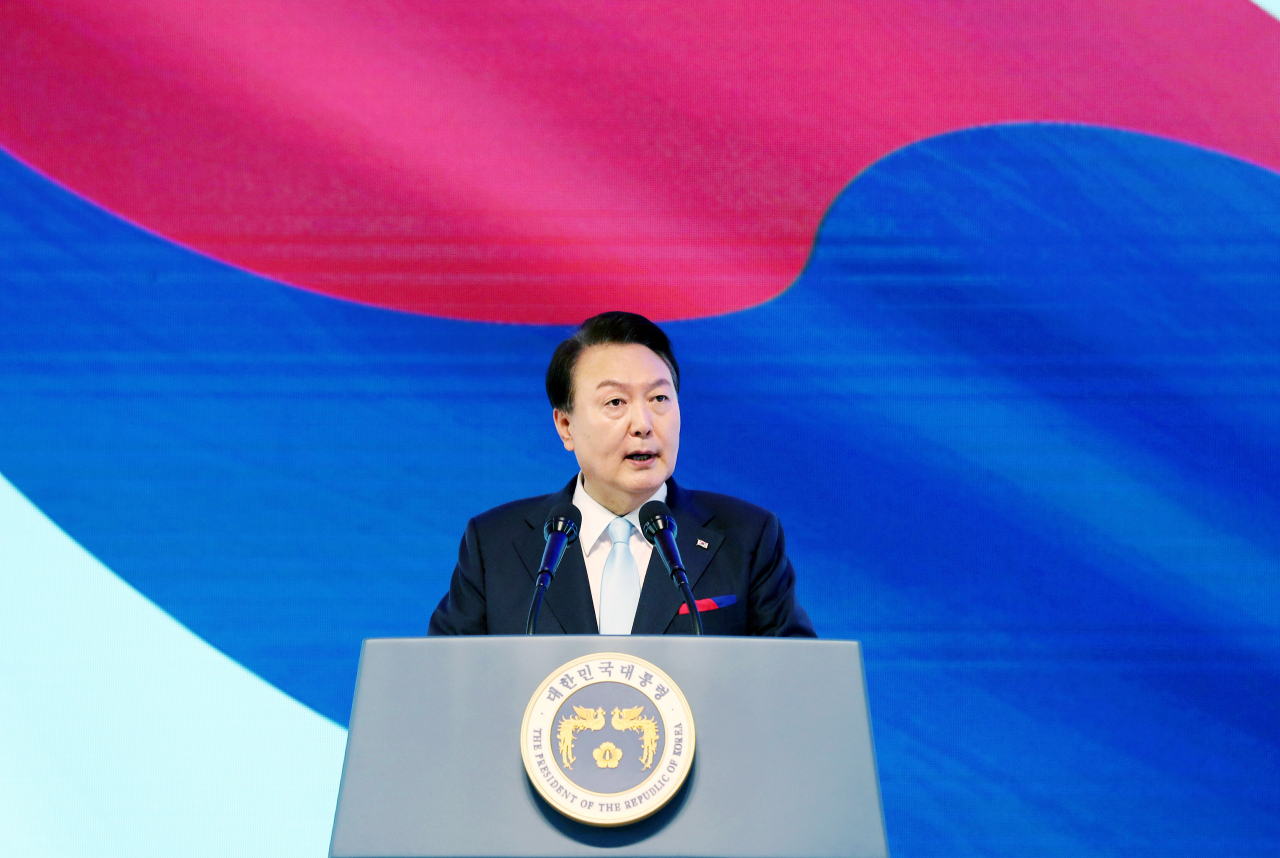Yoon calls Japan 'partner' with shared interests in Liberation Day speech
President warns against anti-state forces 'disguised' as democracy activists
By Shin Ji-hyePublished : Aug. 15, 2023 - 14:08

President Yoon Suk Yeol labeled Japan as South Korea's partner, sharing universal values and common goals, while underscoring the importance of trilateral security cooperation with Tokyo and Washington in deterring North Korea on the annual Liberation Day holiday that marks the end of Japan's 35-year colonial rule of the Korean Peninsula.
In a nationally televised address, Yoon also cautioned that South Korea remains under constant threat from "anti-state forces" aligned with "communist totalitarianism," though he did not explicitly expound on the identities of these forces.
“As partners that cooperate on security and the economy, Korea and Japan will be able to jointly contribute to peace and prosperity across the globe while collaborating and exchanging in a future-oriented manner,” he said.
After Yoon's call last year for the two nations to "move toward the future," he has made significant strides in mending ties with Japan despite backlash from the public, activists and opposition parties. Yoon and Japanese Prime Minister Fumio Kishida have met bilaterally six times, and more in multilateral settings.
Yoon also emphasized security cooperation among South Korea, the US and Japan, looking ahead to a trilateral summit at Camp David in Maryland on Friday. He said the summit will “set a new milestone” in trilateral cooperation contributing to peace and prosperity on the Korean Peninsula and in the Indo-Pacific region.
“Notably, the significance of ROK-US-Japan trilateral security cooperation is increasingly growing on the Korean Peninsula and in the region,” Yoon said.
“The three countries must closely cooperate on reconnaissance assets and share North Korea’s nuclear weapons and missiles data in real time in order to fundamentally block North Korea’s nuclear and missile threats,” he added.
Yoon said the seven rear bases provided to the United Nations Command by the government of Japan “serve as the greatest deterrent” in keeping the North from invading the South. A renewed North Korean invasion would trigger automatic and immediate intervention and retaliation by the UNC, and the UNC rear in Japan is sufficiently equipped with necessary land, sea and air capabilities, he added.
“The UNC is a great example of international solidarity that has played a key role in firmly safeguarding the Republic of Korea’s freedom under one flag,” he said.
Mentioning the "stark difference" between the South, which embraced free democracy, and the North, which has adhered to totalitarian rule, Yoon warned that there were still "rampant anti-state forces" that blindly follow communist totalitarianism, distort public opinion and disrupt society through manipulative propaganda.
He said the totalitarian forces disrupted and attacked society and took advantage of the legal rights enshrined in a free society. “That is the way they survive.”
The president viewed the forces of communist totalitarianism as having always "disguised themselves as democracy activists, human rights advocates or progressive activists" while engaging in unethical tactics and false propaganda.
“We must never succumb to the forces of communist totalitarianism,” he said. “We must not be deceived by those who follow and serve them.”
This is not the first time Yoon has alluded to anti-state forces. In June, he said anti-state forces with a distorted sense of history and an irresponsible view of the state had appealed for the lifting of United Nations Security Council sanctions against North Korea, which is advancing its nuclear armament. Yoon's comments were then apparently targeting the former left-wing administration of previous President Moon Jae-in.
Like in his first Liberation Day speech last year, Yoon also mentioned an "audacious initiative" for North Korea. He said the government will steadfastly implement the initiative, but will also work with the international community to force the North Korean regime to stop advancing its nuclear and missile programs and embark on a path toward dialogue and cooperation.
On the same day, Japanese leaders, including ruling Liberal Democratic Party policy chief Koichi Hagiuda, visited Yasukuni Shrine in Chiyoda, Tokyo, according to Japanese media outlets. The shrine honors the souls of Japanese wartime leaders including those convicted as war criminals after World War II. Kishida also sent a ritual offering to the controversial shrine.
The Korean Foreign Ministry expressed “deep disappointment and regret” that the responsible leaders of the Japanese government and parliament have once again paid tribute or paid pilgrimage to the Yasukuni Shrine, which “glorifies Japan's war of aggression in the past and enshrines war criminals.”



















![[Today’s K-pop] Treasure to publish magazine for debut anniversary](http://res.heraldm.com/phpwas/restmb_idxmake.php?idx=642&simg=/content/image/2024/07/26/20240726050551_0.jpg&u=)